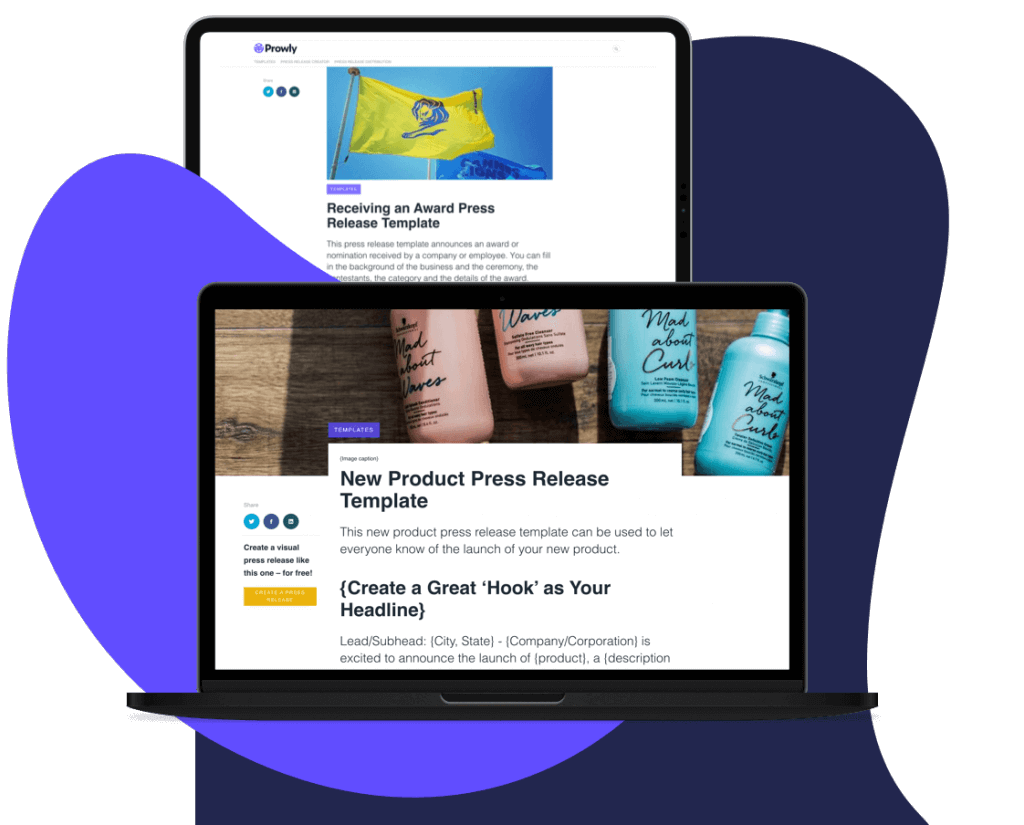Your brand doesn’t exist in a vacuum. Every media mention of your brand online, known as a ‘brand mention,’ plays a crucial role in shaping your reputation and visibility.
By understanding and tracking brand mentions and PR results, you can clearly see the difference between a thriving brand and one that’s struggling to capture attention.
In this article, we’ll dive into the world of brand mentions and uncover how they can make or break your PR efforts.
If you’re short on time and just looking for a tool to track your brand mentions, Prowly’s Media Monitoring tool offers a 7-day free trial where you can test the tool and decide if it matches your business needs.
Brand mentions meaning
Brand mentions are cases when a specific brand is mentioned online, discussed, or referred to on any digital platform in various forms of communication. This could be on blogs, social media posts, news articles, or forums, just to name a few.
These mentions can be either tagged (direct) or untagged (indirect) and they do not necessarily include a link to your website.
Mentions can occur in three different types of sentiments: positive, neutral or negative. They are a key indicator of your brand’s presence and reputation in the public sphere.
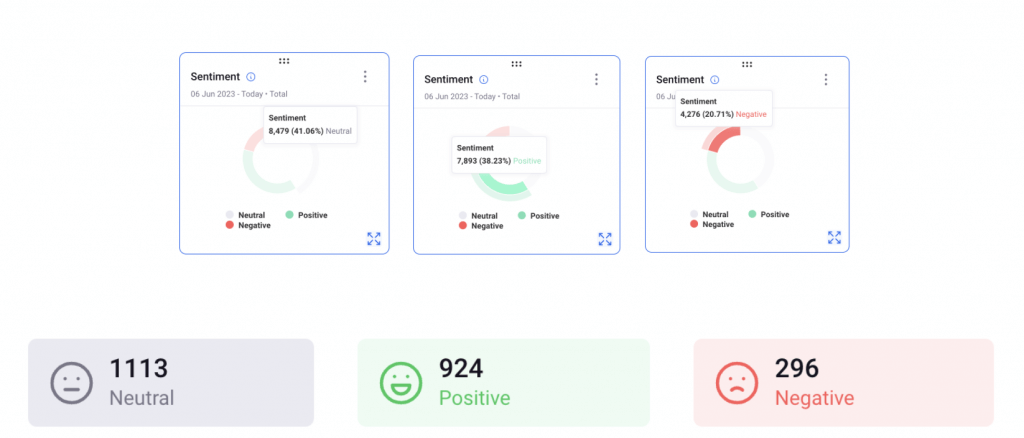
The benefits of tracking brand mentions
For businesses across industries, brand mentions are a thermometer for the health of their brand. Through online mentions, businesses can monitor their online reputation, their customers’ opinions of them, and the effectiveness of their PR strategies.
Tracking brand mentions is a practice of setting up a filter and getting notifications every time someone uses your brand name or designated keywords. It sounds simple, but it’s a tool that can super power your PR.
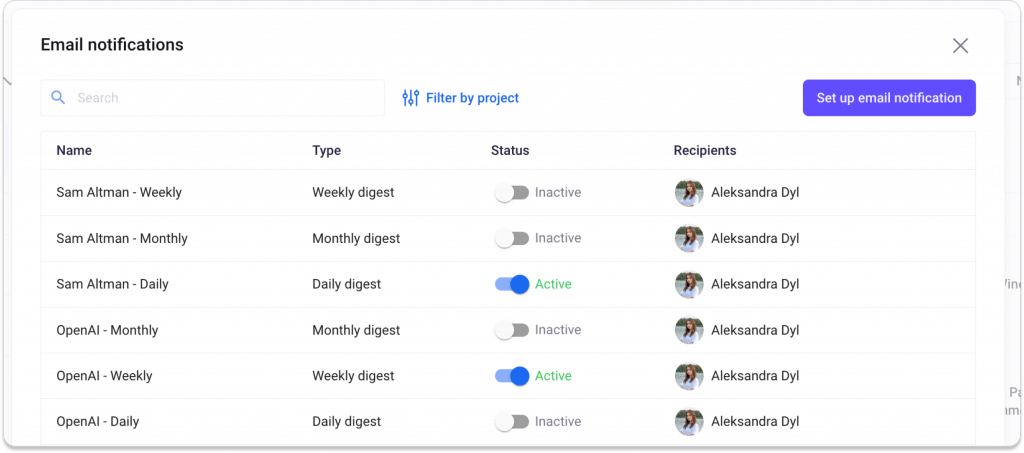
Effectively monitoring and responding to brand mentions can enhance your brand image, boost customer engagement, and provide valuable insights into the public perception of your brand.
Types of brand mentions
There are several different types of brand mentions, depending on the source the mention comes from:
📌 Social media mentions: networks such as Facebook, Instagram, LinkedIn, Pinterest, TikTok, X (Twitter), and others
📌 Forums and communities: different types of discussion communities around the web, including Reddit
📌 Reviews and testimonials: websites such as Amazon, TripAdvisor, Yelp, Capterra, G2, Trustradius, and others
📌 Blog post mentions: various blogs around the world wide web
📌 News articles: news outlets on global, national, regional and local levels
A good brand mentions tool captures all of these mentions and groups them according to source and sentiment.
Why brand mentions matter
If you’re considering whether or not to track brand mentions online, you may be wondering if it’s a worthwhile investment of time and money. Here are some use cases for collecting and analyzing brand mentions:
1️⃣ Reputation management
Brand mentions can not only be positive but also negative: while many boost your brand’s reputation, some may harm it. Tracking these brand mentions becomes a vital part of reputation management, giving you a real-time look into what the public thinks about your brand.
Using social listening tools, you can track brand mentions on social media, gathering insights into the conversations happening around your brand. This real-time monitoring allows you to promptly address criticism and make the most out of positive feedback, thereby molding a favorable brand image.
This constant stream of feedback also serves as a valuable resource for devising effective PR strategies. In essence, proactive online reputation management through brand mentions tracking is an investment in the longevity and integrity of your brand equity.
2️⃣ Customer perception and trust
You no longer have to wonder how customers perceive your brand or what you offer. With brand mentions, you’ll get a detailed analysis of how your (potential) customers perceive you as a brand. Moreover, you’ll know if they trust you or not, without launching complicated research campaigns.
3️⃣ Social proof
How to measure brand mentions and their value? Think social proof. In simple terms, social proof is the way others talk about your brand. This can be reviews, testimonials, quotes, videos covering your product, or any instance of someone speaking about you in a positive light.
Typically, collecting social proof can be a very tedious process, but not when you track brand mentions with a Media Monitoring tool, like Prowly. Each brand mention includes PR metrics and additional information to accurately assess and present the value of your coverage.
4️⃣ Crisis management
Most people who wonder how to track brand mentions have already been in a sticky situation. A crisis happens and, all of a sudden, your brand gets torn to bits online. A faulty product, a poor review that was left unanswered, a rude customer support agent — any little thing could spark an outrage online.
Luckily, you can set up the live tracking of your brand mentions. If you see a bunch of mentions coming in at once, all with a negative sentiment, it means that a crisis is brewing.
5️⃣ Competitor analysis
The great thing about brand mentions is that you can track other people’s brands too. If you want to stay in the loop with how, when and in what context people online mention your competitors, you can. Just add your competitors’ brand terms and you can get real-time notifications.
If they have a feature that is annoying their customers, if they’re slow to respond, or if they’ve just caused a proper social media crisis, you’ll be the first to know.
6️⃣ Industry trends
Brand names are not the only thing you can track with brand mentions software. You can also type in industry categories, product names, new technologies and anything else that comes to mind.
For example, if you want to keep up with the latest news about ChatGPT, you can just track the term and get notified when news and other mentions roll in.
You can also learn all about using social monitoring for PR from The Complete Social Media Listening Guide for Public Relations.
How to find brand mentions
There are a few ways to track brand mentions depending on the time and money you have and the quality of results you need.
Manual search
In this approach, you type your brand name into Google and social media search bars and see what comes up. To get up-to-date mentions, you have to check search results on a daily or even hourly basis. Also, you can say goodbye to getting updates in real-time.
| Pros: free Cons: extremely time intensive, impossible to cover all brand mentions from all sources, no real-time notifications |
Google Alerts
If you don’t want to search Google manually, they have a free tool to help you save some time. Simply choose your brand term, set up your conditions and the intervals you want to receive those mentions in.
Google Alerts is a cost-free tool, but it does come with a catch. That catch is the possibility of receiving unreliable hit-and-miss alerts, which can cause you to miss out on important media mentions that showcase the value of your PR efforts.
| Pros: free brand mentions tool Cons: covers Google searches only, not very precise |
→ Read more about Google Alerts’ alternatives in our article “The Best Google Alerts Alternatives for PR Pros.”
Media monitoring tools
If you want to track brand mentions on social media, forums, websites and every other source online, media monitoring tools (or brand mentions tools) fit the bill. Tools such as Prowly allow you to not only track, but also to analyze brand mentions and sort them according to sentiment.
Prowly is fast, accurate, gives you instant notifications in real-time, and analyzes the sentiment of each mention. You can then analyze each mention according to the sentiment attached to it. This lets you spot media crises in time, among other benefits.
| Pros: fast, accurate, covers all types of sources Cons: not free |
How to track brand mentions with Prowly
Save time for your PR team by signing up for Prowly and automating your brand mention tracking. Once you’ve signed up, go to your media monitoring dashboard and add the terms you want to track.
You can then choose the specific authors you want to follow, your preferred languages, or types of sources. For example, you can filter down to only blog articles written in Japanese.
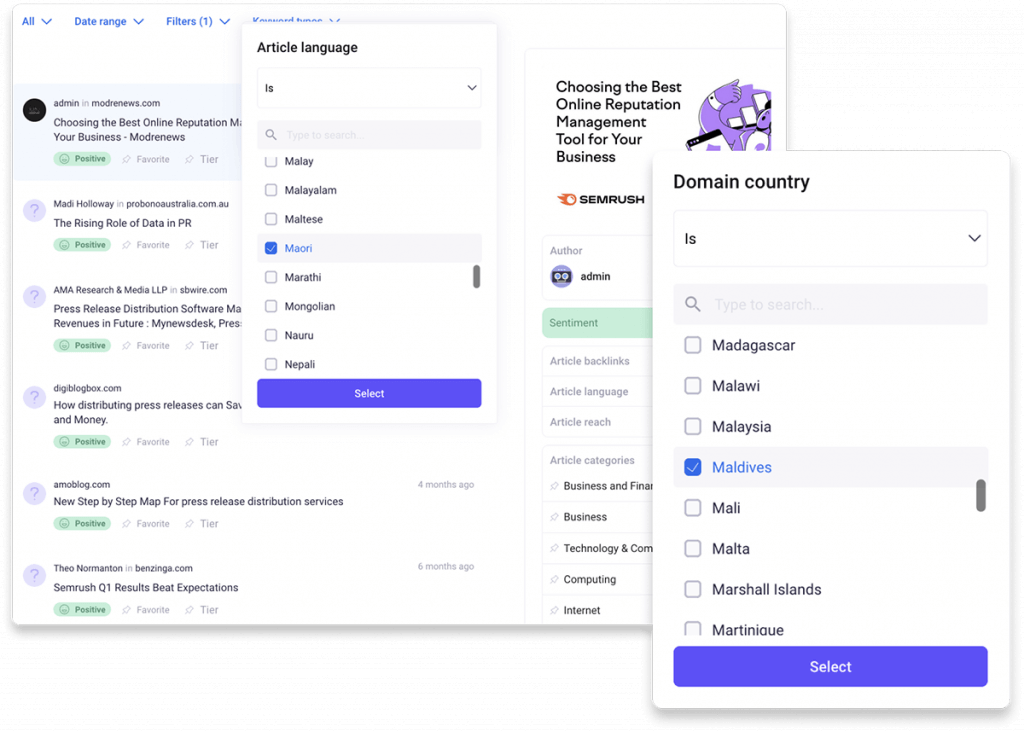
Once readied, it’s time to set up email alerts. You can choose to get notifications immediately or set up a time interval for emails to arrive with collections of the most recent mentions. You can schedule them once per day or week or whatever works for your PR team.
When you need a more detailed look, hop on to your dashboard for more information.
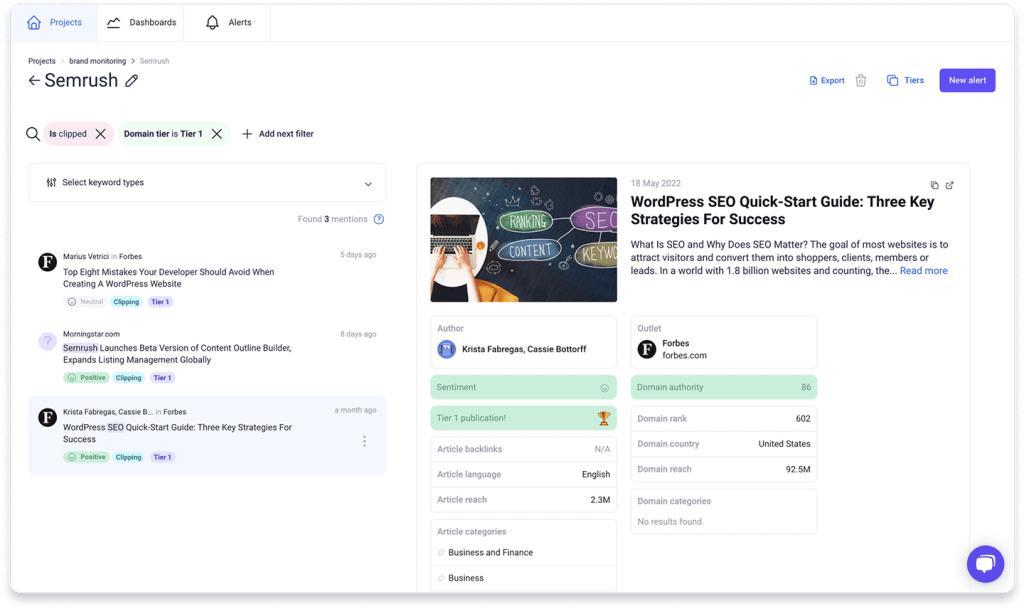
You’ll get a breakdown of your mentions, the sources and the sentiments attached to each mention.
Once the end of the month comes by, you can generate a PR report automatically in Prowly. Choose the layout of the report and customize it to your (and your manager’s) liking to provide the latest PR insights. No more gambling with your reputation — get data-driven insights.
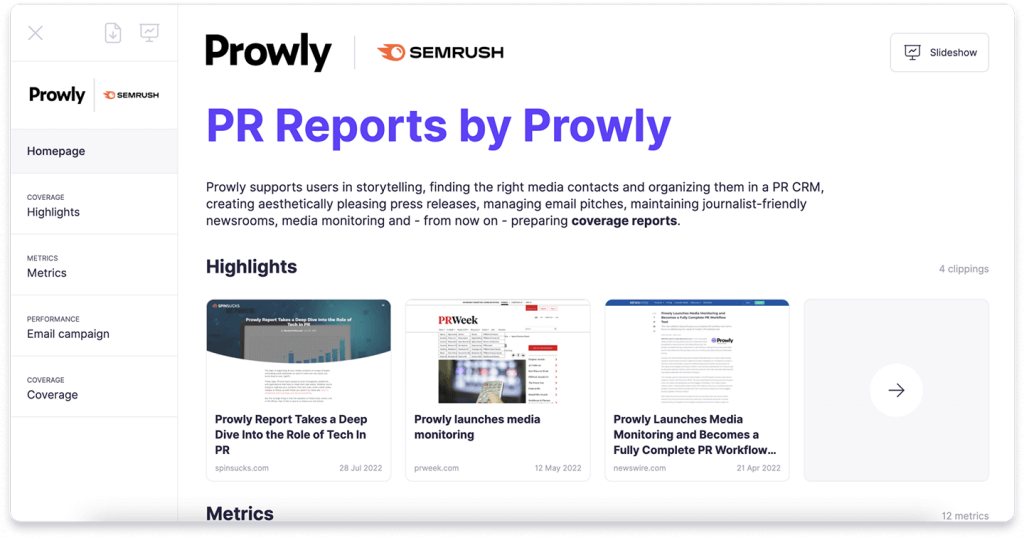
Tips for tracking brand mentions
If you’re new to tracking brand mentions, we have a few handy tips to help you get started.
📌 It’s not just the brand name
Brand mention tools let you track literally any term you can think of. This means you can choose a wide variety of terms alongisde your brand name. For example:
- spokesperson names
- online authors
- authors you want to track online
- product names (e.g. “CRM software”)
- category terms (e.g. “healthcare communications”)
And all of this for yourself and for your competitors.
While your brand term should be the first thing to start with, don’t limit yourself. Every brand mentions tracking tool comes with a number of keywords you can track by a specific plan, so make good use of those keywords.
📌 Analyze your sentiment on the fly
Great monitoring software like Prowly does more than just collect brand mentions. As each mention comes in, Prowly analyzes the context around it and sorts the mentions according to sentiment, organizing them into three groups:
- positive
- neutral
- negative
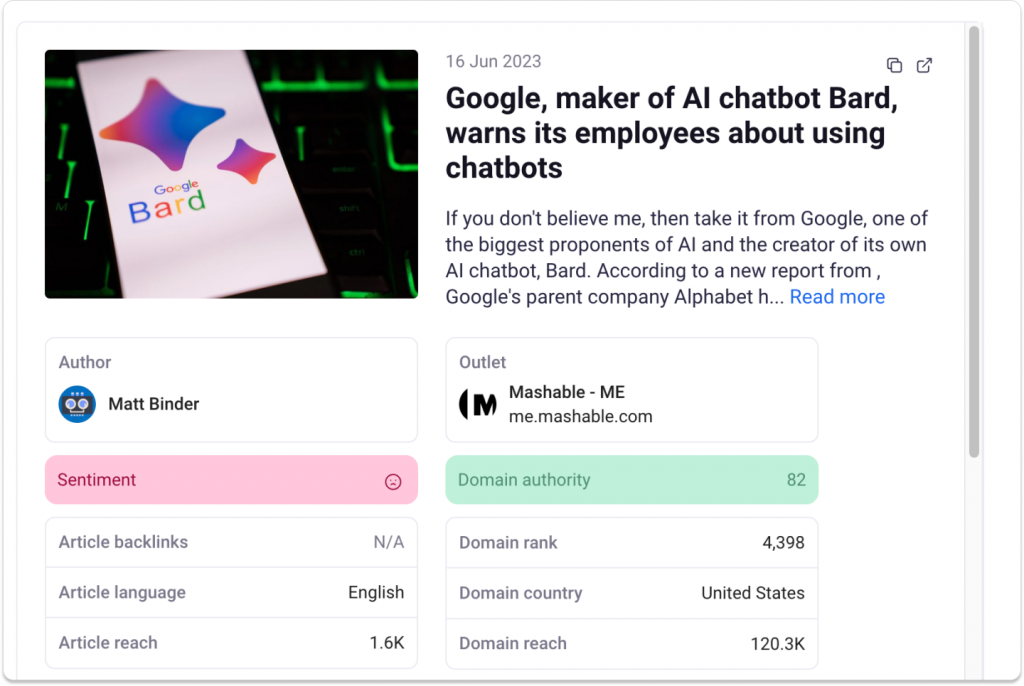
This lets you sort all of your brand mentions automatically using language learning algorithms. For example, if you see a large number of negative mentions coming in over a short period of time, this means that a crisis is looming and you need to look into it.
📌 Track variations of your brand name
If you assume that your (potential) customers know how to spell your brand name perfectly, you’re wrong. Depending on what the brand name is, there could be many alternatives that people use. For example, you could search for “Mailchimp” or “mail chimp” with equal success. If you set up just one of these as a term to track, you could miss out on valuable mentions.
Conclusion
Tracking brand mentions is not an afterthought, it’s a vital part of a great PR strategy. No matter what industry you’re in, tracking brand mentions allow you to stay on top of reputation management, avert crises, and keep an eye on your competition.
And it doesn’t have to cost an arm and a leg to get started, either. With Prowly, you can start monitoring the web for your branded (and other) terms today completely free for 7 days.


